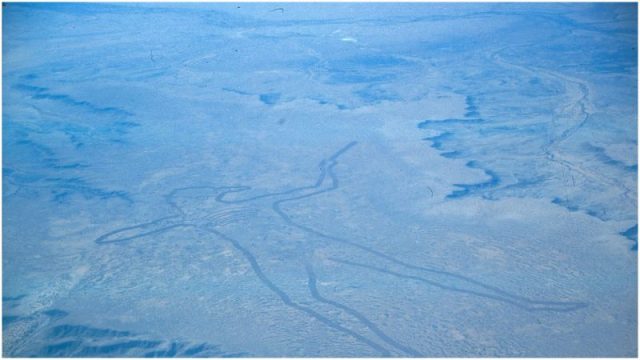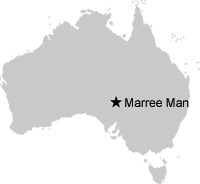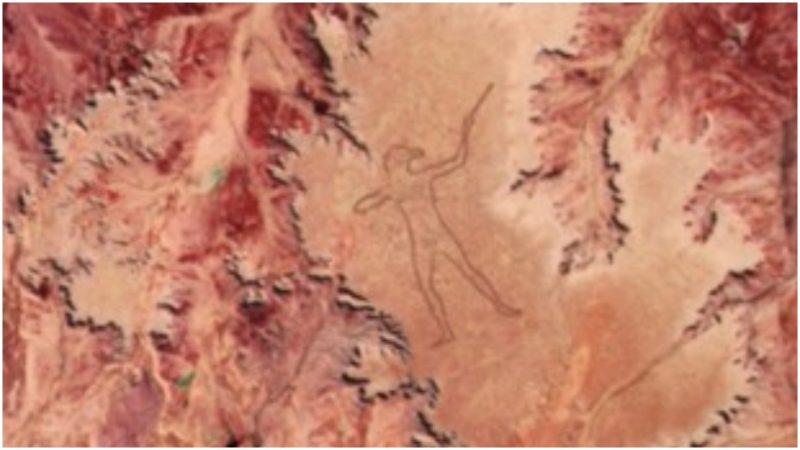The first thought that comes to mind when beholding it is that this enormous piece of land art was made by the ancients to serve as a sign for the gods, or as a mythical representation of some tribal hero. But this is not the case with the Marree Man, the second largest geoglyph in the world. It was discovered recently after a plane flew over it in 1998, and it was probably created recently as well. The only problem is, nobody knows who made it or why.
Although it was the 1990s and information about somebody doing something traveled fast, somehow an individual or a group of artists managed to get to this hardly accessible part of South Australia, on the plateau of Finnis Springs, just outside an Australian military base called Woomera Prohibited Area, and created this huge geoglyph with a perimeter of 17 miles. It was definitely a massive undertaking that demanded a lot of labor, and it is strange how nobody noticed–especially because it was close to a big military base.
On June 26, 1998, Trec Smith, a local pilot, flew from the nearby town of Marree to Cooper Pedy and noticed the drawing that was spread across the whole plateau. Later, a hotel in the area claimed that they received an anonymous fax with the coordinates of the geoglyph. Soon the Marree Man geoglyph became headline news across Australia. A big part of the fascination lay in the fact that nobody knew who actually made it. It seemed like some extraterrestrials came and did it in a few seconds.

So what is the Marree Man? Visually speaking, the Marree man is a depiction of a man who holds a boomerang (or a woomera–a throwing stick that was used to chase away birds). Upon examination, it was discovered that the lines of the Marree man were about 8 to 12 inches deep and 114 feet wide. The whole figure is an astonishing 2.6 miles long, and it takes up a perimeter of 17 miles.
The following year, the media was anonymously informed that a small plaque was buried just 16 feet south of Marree Man’s nose. The plaque turned out to be a little American flag with Olympic rings over it. The short text on the plaque reads:
“In honour of the land they once knew. His attainments in these pursuits are extraordinary; a constant source of wonderment and admiration.”
Research was done on this quote, and it was discovered that it comes from a 1946 book written by H. H. Finlayson called The Red Centre. The book is about the hunters of the Pitjantjatjara tribe–the tribe that lives around the Uluru rock formation. These particular words come from a chapter in which the author describes how wallabies were hunted with the use of throwing sticks. The section also describes the look of the hunters, who were naked and had initiation marks on their bodies.
The media received another anonymous message with the name of the artwork. Supposedly it was called “Stuart’s Giant,” after John McDouall Stuart, the famous explorer who led the first expedition across Australia.
Reception of the newly created geoglyph was mixed but mainly positive. A lot of people wanted it to stay. After all, it started bringing tourists to the area. One of the local newspapers, the Advertiser, wrote that the land drawing should be made permanent. Because of the weather conditions in the region, the Marree Man started to erode and disappear. By 2013 it was barely visible, so people demanded that the lines should be made deeper; down to the white chalk layer beneath the ground. Those that were against it, like Dorothy Kotz, the Minister for Environment and Heritage at the time, described the figure as “environmental vandalism.” David Ruthman, who was the Minister for Aboriginal affairs called it “graffiti.”
There are two main theories about the author of this modern geoglyph. According to some people, it was made by Aboriginal artist Bardius Goldberg, who died in 2002. He was the perfect suspect. He lived in Alice Springs and had often discussed his wish to create a piece of art that would be visible from space. One of his friends said that he received $10,000 during the time when the figure was discovered. Goldberg never confirmed nor denied this claims.

Another theory is that the geoglyph was made by a group from the United States. This is possible because of several facts. First of all, the description of the figure is written in feet instead of meters; also, the term Aboriginal “reservations” is mentioned, and this word is never used to describe the Aborigines. Another clue is a jar that was found buried near the Marree Man. In it, an American flag, together with a satellite picture of the geoglyph, was found. There was also a note in which the infamous Branch Davidian sect was mentioned. Despite all the clues, the creation of the Marree Man is still a mystery.
Mystery aside, this geoglyph is still an attraction. In 2016, its decaying lines were fixed with the help of a satellite-guided tool. Now it is visible again, and although the area is off-limits, those who want can take a flight over it and see it.
